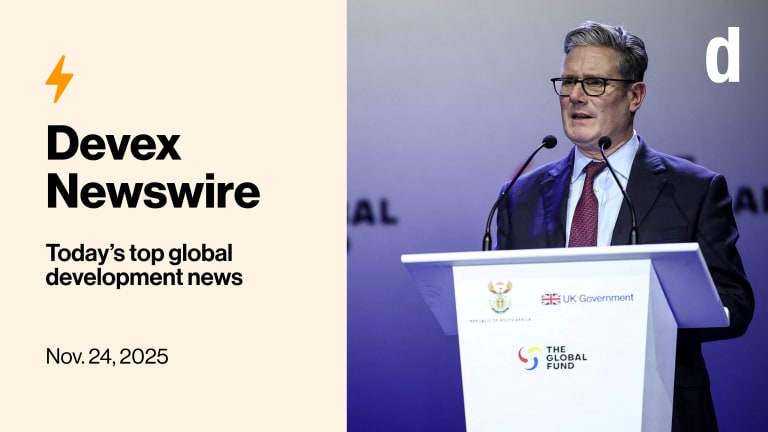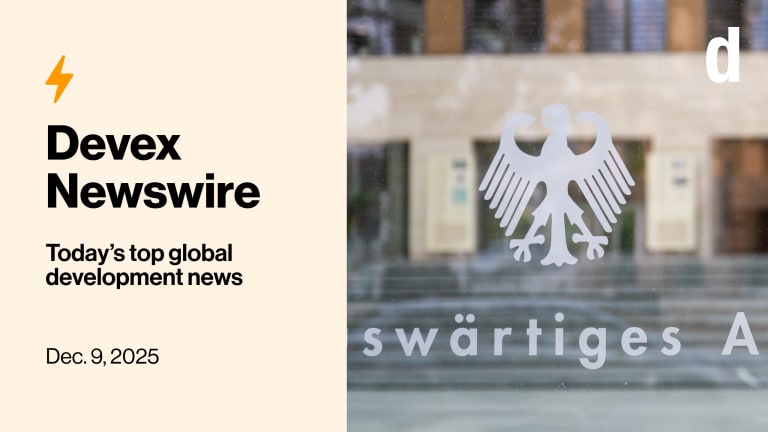Presented by International Telecommunication Union

The whole world is looking to the upcoming development finance summit in Seville as a way to set up for development’s future – one where the U.S. is a lot less of a powerhouse.
Also in today’s edition: Canada might just buck a global trend by holding firm on aid spending, and a look at disappointment over the U.K.’s lack of nutrition pledges.
A reckoning in Seville
This is a preview of Newswire
Sign up to this newsletter for an inside look at the biggest stories in global development, in your inbox daily.
From June 30 to July 4, development leaders from around the world will gather in Seville, Spain, for the Fourth International Conference on Financing for Development, aka FfD4, an occasional but impactful summit that sets the global finance agenda.
The stakes? Huge. The U.S. is pulling back — slashing aid, rejecting the U.N. Sustainable Development Goals, and fueling uncertainty with tariff threats. But that vacuum might be an opening. After the Trump administration walked away from the long-stalled Pandemic Agreement, “suddenly it opened up new possibilities of making it legally binding," says Minh-Thu Pham of Project Starling.
Since 2002, FfD has shaped norms on aid and development, including the setting of the 0.7% of gross national income target for aid spending. At the 2015 Addis Ababa conference, countries figured out how they’d try to finance the then recently set SDGs, my colleague Jesse Chase-Lubitz writes.
This time, expect fiery debate on debt relief, trade, cuts to official development assistance, tax reform, and whether flashy private finance promises are really enough.
And with the U.S. taking a back seat, things could get very interesting. “It’s also an opportunity to have new types of coalitions,” said Jean Van Wetter of Enabel during a recent Devex Pro event. He ruminated that the conference could show alternative leadership to that of USAID.
Read more: What is Financing for Development 4 and why is it a big deal? (Pro)
+ With debt pressures mounting and aid budgets shrinking, the upcoming FfD4 isn’t just another summit — it’s where development’s financial future could be rewritten. Ahead of the talks, Devex Pro is hosting a special online event series to unpack what’s really at stake.
Today at 10:30 a.m. ET (4:30 p.m. CET), Iolanda Fresnillo, David Grigorian, Eric LeCompte, and Hannah Ryder will discuss the politics, power dynamics, and reform proposals shaping the global debt conversation. There’s still time to save your spot.
And on Thursday, June 5, British International Investment’s Chris Chijiutomi goes behind the scenes on investing in fragile African markets — and what DFIs need to succeed where aid is retreating. Register now for this event.
Canadian beacon
Canada could maintain development spending under the new government despite mounting fiscal pressures, downplaying speculation of aid cuts as other donors slash budgets.
“There’s no suggestion about the need to do cuts,” a senior Canadian official told Devex Editor-in-Chief Raj Kumar at the Hamburg Sustainability Conference, even while acknowledging “we’re in a world of huge pressures.” Canadian Prime Minister Mark Carney's decision to keep a separate minister for international development signals commitment, while other governments merge portfolios.
Canada recently consolidated fragmented development programs after years of “artificial” divisions between geographic and multilateral teams. The reorganization brings together everything from multilateral development bank relations to peace operations under one roof.
The official also warned that the U.N. system is “on the verge of collapse” with headquarters failing to match the field operations’ sense of urgency on reform. She described visiting U.N. country offices where agencies work in “stovepipes” with little effective coordination between agencies.
With the U.S. engagement declining, middle powers are now “the incremental money.” The official noted that countries such as Canada and Spain have an opportunity to use their funding influence to drive U.N. consolidation.
Canada’s G7 presidency priorities include private capital mobilization and infrastructure development — two areas where the new prime minister, who formerly served as governor of the Bank of Canada and the Bank of England, has extensive experience. Carney has also ordered a rapid foreign policy review that the official said will focus on “practical, action-oriented approaches” while strengthening alliance relationships amid growing global instability.
Background reading: How did Canadian aid change under Justin Trudeau? (Pro)
+ Curious about the insights that drive global development? Experience the power of Devex Pro with a 15-day free trial. Explore expert analyses, unlock hidden funding opportunities, connect with key players at exclusive events, and access a wealth of knowledge you won’t find anywhere else.
Swiss miss
Last week, U.N. Secretary-General António Guterres instructed his more than 75 top managers to produce proposals to cut 20% of staff in their departments and agencies and to reduce spending by 14% to 20%.
The director-general of the U.N.’s Geneva office, Tatiana Valovaya, warned her staff in a memo seen by Devex that she would not be able to achieve those cuts without painful layoffs. “The reality is that we do not have enough vacant posts or expected retirements to absorb the full impact of this reduction, This means that regrettable, some serving staff may be affected.”
“We are carefully reviewing how such a cut could be implemented,” she added. “Our clear priority is to minimize the impact on serving staff to the greatest extent.”
For the time being, Valovaya noted: “No decisions have been finalized, and any proposals we develop here … will require review and approval by both Headquarters and the Member States. Until then, the situation remains fluid and uncertain.”
“I know this can be unsettling, and I want to acknowledge the stress and uncertainty it might be causing many of you,” she added. “Let me assure you that we are doing everything we can to manage this process with transparency and fairness.”
ICYMI: UN chief outlines plans for thousands of new job cuts
Skipping meals
The U.K. government has declined to commit new funds for global nutrition, citing its ongoing spending review and defense budget hikes. Nutrition advocates called the move “deeply concerning,” accusing the United Kingdom of walking away from a legacy of leadership after the government passed on pledging at the record-breaking Nutrition for Growth summit. Though it co-founded UNICEF’s Child Nutrition Fund in 2022, it now won’t commit to pledging funds there either, despite a parliamentary report urging the government to pledge at least £50 million ($67.55 million).
The U.K. defended its aid cuts as necessary to meet defense spending targets. But members of Parliament, including International Development Committee chair Sarah Champion, questioned whether development policy is being “held hostage by the spending review process.”
Nutrition-specific U.K. aid spending is now at its lowest since 2011, even as global hunger remains stubbornly high, with 733 million people undernourished in 2023.
Read: UK’s reticence to pledge support for nutrition ‘deeply concerning,’ experts say
Bond, smaller Bond
Facing rising costs and limited grant funding, U.K. NGO network Bond says it will be combining some roles, filling vacancies internally, and moving its staff to a coworking space rather than renewing its office lease. Bond CEO Romilly Greenhill says the changes were necessary to respond to the rising costs and increasingly scarce grant funding available.
“These steps will strengthen our financial position and enable us to continue delivering high-quality support for our members and the wider sector,” she says.
ICYMI: With FCDO slashing budgets, where will UK NGOs turn for funding? (Pro)
Slash and burn
At this year’s World Health Assembly, one theme dominated: Donor cuts — especially from the U.S. under Trump — are wreaking havoc on global health programs.
“This is a pandemic-scale interruption for services and systems,” said Dr. Bruce Aylward, an outgoing WHO assistant director-general. “But it’s not a virus [for] which we can rapidly develop a vaccine, protect our populations, and get back to business.”
Governments are scrambling to respond, but the gap is massive, Devex contributing reporter Andrew Green writes. “The time for domestic financing is indeed now, if not actually yesterday,” Aylward warned. Yet raising revenue or integrating services takes time.
“We have never seen the level of cuts at this accelerated pace,” said Matthew Kavanaugh of Georgetown University’s O’Neill Institute. “No government in the world that’s a low-income government can immediately find tens of millions of dollars on a week’s notice. ... That’s not possible.”
Read: Can domestic financing solve the global health funding crisis?
In other news
Germany’s former finance minister, Annalena Baerbock, has been elected as the president of the 80th session of the U.N. General Assembly. [France 24]
U.N. chief António Guterres has called for an independent probe into the deaths of more than 30 Palestinians after conflicting accounts over whether Israeli forces fired on civilians at an aid distribution site in Gaza. [BBC]
Oxfam GB is facing protests from union members over its plans to cut more than 200 jobs and allegedly outsource roles. [Third Sector]
Sign up to Newswire for an inside look at the biggest stories in global development.








